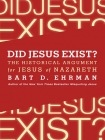Did Jesus Exist? - The Historical Argument for Jesus of Nazareth by Bart Ehrman (ebook reader browser .TXT) 📗

- Author: Bart Ehrman
Book online «Did Jesus Exist? - The Historical Argument for Jesus of Nazareth by Bart Ehrman (ebook reader browser .TXT) 📗». Author Bart Ehrman
From M: Jesus states that he came to fulfill the Law and that his followers must keep the Law even better than the scribes and Pharisees if they want to enter into the kingdom of heaven (Matthew 5:17, 19–20).
From John: Jesus argues with his opponents about the Law and points out to them that “the scripture cannot be broken” (John 10:34–35).
I should stress that some of these multiply attested sayings appear to pass the criterion of dissimilarity. For example, in the first passage mentioned (Mark 10:17–27), when a rich man asks Jesus how to have eternal life, he tells him to “keep the commandments.” Is this what early Christians thought, that it was by keeping the Law that a person would inherit eternal life? Quite the contrary, this is a view that the vast majority of Christians rejected. The early Christians maintained that a person had to believe in the death and resurrection of Jesus for eternal life. Some early Christians—an increasingly greater number with the passage of time—argued precisely against the idea that keeping the Law could bring eternal life. If it could, then what was the purpose of Christ and his death? No, it was not the Law but Jesus who could bring salvation. So why is Jesus portrayed in this passage as saying that salvation comes to those who keep the Law? Because that is something that he actually said.
What, more specifically, did Jesus teach about the Law? Perhaps it is easiest to explain his views by setting them in contrast with other perspectives that we know something about. Unlike certain Pharisees, Jesus did not think that what really mattered before God was the scrupulous observance of the laws in all their details. Going out of one’s way to avoid doing anything questionable on the Sabbath was of very little importance to him. That is why he constantly had confrontations with Pharisees on the issue. Unlike some Sadducees, Jesus did not think that it was of the utmost importance to adhere strictly to the rules for worship in the Temple through the divinely ordained sacrifices. In fact, as we will see, his opposition to the Temple and its cult eventually led to his death. Unlike some Essenes, he did not think that people should seek to maintain their own ritual purity in isolation from others in order to find God’s ultimate approval. As we will see in a moment, his reputation was tarnished among people like this, as he associated precisely with the impure.
What did matter for Jesus—as for some other Jews from his time about whom we are less well informed (see, for example, Mark 12:32–34)—were the commandments of God that formed, in his opinion, the very heart of the Law. These were the commandments to love God above all else (as in Deuteronomy 4:4–6) and to love one’s neighbor as oneself (as in Leviticus 19:18).
This emphasis on the dual commandments to love is found in our earliest surviving Gospel, in a passage that deserves to be quoted at length:
And one of the scribes who came up heard them arguing, and noticing that [ Jesus] was giving good answers, he asked him, “What is first among all the commandments?” Jesus answered, “The first of all is this: ‘Hear, O Israel, the Lord our God is one Lord, and you shall love the Lord your God with your whole heart and your whole soul and your whole understanding and your whole strength’ [Deuteronomy 6:4–5]. This is the second: ‘You shall love your neighbor as yourself’ [Leviticus 19:18]. There is no other commandment greater than these.” And the scribe said to him, “You are right, teacher; you speak the truth, because ‘He is one and there is none other than him,’ and ‘to love him with all one’s heart and understanding and strength’ and ‘to love one’s neighbor as oneself’ is much more than all of the burnt offerings and sacrifices.” And when Jesus saw that he replied intelligently, he said, “You are not far from the kingdom of God.” (Mark 12:23–34)
Notice: the kingdom of God again. The way to attain the kingdom, for Jesus, was by following the heart of the Law, which was the requirement to love God above all else and to love other people as much as (or in the same way as) one loved oneself.
The real, social, and practical implications of this teaching can be seen in a passage now found in the Gospel of Matthew, which passes our criterion of dissimilarity. At the end of Matthew 25 we find Jesus’s famous description of the final judgment, in which the “Son of Man comes in his glory, and all the angels with him, and he sits on his glorious throne” (Matthew 25:31). All the nations appear before the Son of Man, and he separates them into two groups, as a shepherd would separate the sheep from the goats. He welcomes those on his right hand, the “sheep,” and invites them to come and “inherit the kingdom prepared for you from the foundation of the earth.” Why are they entitled to the kingdom? Because, says the king, “I was hungry and you gave me food, I was thirsty and you gave me drink, I was a stranger and you welcomed me, I was naked and you clothed me, I was sick and you visited me, I was in prison and you came to me.” These righteous ones, though, don’t understand since they had never laid eyes on this glorious divine figure, let alone done anything for him. And so they ask, “When did we see you hungry and feed you, or thirsty and give you drink? And when did we see you a stranger and welcome you…?” And the king replies to them, “As you did it to one of the least of these, my brothers, you did it to me” (Matthew 25:34–40).
He then turns to the group on his left, the “goats,” and curses them, telling them to





Comments (0)